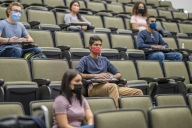You have /5 articles left.
Sign up for a free account or log in.

Istockphoto.com/fpm
NCAA Cancels March Madness
March 12, 4:30 p.m. The National Collegiate Athletic Association canceled the Division I men’s and women’s basketball tournaments, along with all other winter and spring championships scheduled for the remainder of the 2019-20 academic year, the association said in a statement.
“This decision is based on the evolving COVID-19 public health threat, our ability to ensure the events do not contribute to spread of the pandemic and the impracticality of hosting such events at any time during this academic year given ongoing decisions by other entities,” the NCAA said.
-- Greta Anderson
Feds Issue Guidelines for FERPA
March 12, 4 p.m. The U.S. Department of Education has issued guidelines for institutions regarding the Family Educational Rights and Privacy Act, or FERPA, and the novel coronavirus COVID-19.
Generally, FERPA doesn’t allow colleges to provide information about a student to others without their consent. But there are some exceptions that could allow colleges to send information to others without consent as they deal with the spread of coronavirus, according to Amelia Vance, director of youth and education privacy at the Future of Privacy Forum. Vance said much of that guidance was already outlined in what the department released during the spread of the H1N1 virus.
The first exception allows colleges to disclose students’ personal information without their consent if that information is necessary to protect the health and safety of others. For example, if a student tests positive for coronavirus or has symptoms, the college can release a statement saying a student tested positive, without identifying the student.
Colleges could also send emails to students who shared specific classes with the sick student and identify them by name. While the guidance released today says those situations are typically rare, Vance said that likely will not be the case with coronavirus.
For those who are worried about violating regulations, Vance pointed to a 2009 FERPA regulation that said the department won’t second-guess a college’s determination in an emergency unless most people would consider it unreasonable.
The second exception allows colleges to identify students to public health departments. If the college declares it’s an emergency, it can provide that information without students’ consent. If a college said it’s not an emergency, the department could hypothetically issue a subpoena to get the information, Vance said.
College officials should keep in mind that they are required to record instances when they share students’ information without consent, Vance said. She recommends that they keep track in real time so they don’t have to retrace their steps after the situation calms down.
-- Madeline St. Amour
Ratings Agency Details Coronavirus Risks
March 12, 2:30 p.m. Operating and enrollment pressure could build on some colleges and universities as COVID-19 spreads, according to a note out this afternoon from Fitch Ratings.
Institutions with limited liquidity, those that rely heavily on tuition revenue and those that rely more heavily on endowment draws to fund operations generally have less ability to absorb revenue volatility before their finances take a hit, the note said. Those with larger operating margins and cash flow flexibility enjoy a stronger position.
Sources of operating risk include campus closures or other restrictions on students, faculty and staff. They also include lower dorm-occupancy rates and branch campuses abroad closing. Closures of only a few weeks aren’t expected to have a large impact on colleges’ operating performance, but pressures will build the longer campuses are shuttered.
Fees loom as an important issue. Income from auxiliary services like housing, dining and parking have grown in importance for many colleges and universities. A decline in fee revenue from services could affect margins if it stretches into the fall 2020 semester, according to the ratings agency.
Normally, universities don’t have to refund auxiliary fees, but some colleges may be choosing to do so on a prorated basis for services no longer being provided.
Fitch expects reliance on online classes to grow in the next few months, adding to an expected increase in online education over the long term. Enrollment during campus shutdowns could decline at institutions without strong online learning platforms.
Universities with significant international student populations could be in line for reduced enrollment and subsequent pressure on net tuition revenue in the upcoming academic year. The risk is notable because research universities tend to have the largest numbers of international students, but they also have stronger financial profiles than other types of institutions.
Market declines are expected to hit endowments but not have an impact on bond ratings. Fitch also mentioned the possibility that reduced economic activity could hit state budgets and in turn public funding for colleges and universities. But the ratings agency called the size of such effects unclear at this point.
-- Rick Seltzer
Duke Suspends All Athletic Activities
March 12, 2:20 p.m. Duke University appears to be the first power-conference institution to cancel all its athletics events. Vincent Price, Duke's president, said the university was suspending all practices and games, effective immediately.
“We are taking this action to protect the safety of our student-athletes, coaches, staff and others who are essential to these activities,” Price said in a statement. “I know it is a great disappointment to our student-athletes and coaches, whose hard work and dedication to their sports and Duke is inspirational to so many, but we must first look out for their health and well-being. This is clearly an unprecedented moment for our university, our region and the wider world. As we take steps to confront the spread of this virus, I’m grateful for the cooperation and support of the entire Duke community.”
The decision means Duke's perennial powerhouse men's basketball team, currently ranked No. 6 nationally in some polls, will not be participating in the NCAA tournament.
"We emphatically support the decision made by Dr. Price today regarding the suspension of athletic competition at Duke," Mike Krzyzewski, the men's basketball coach, said in the statement. "The welfare of our student-athletes, and all students at Duke, is paramount, and this decision reflects that institutional priority. Certainly, I want to applaud Dr. Price, who took a leadership role with his presidential peers and the Atlantic Coast Conference in arriving at this decision."
The University of Kansas, Arizona State University and West Virginia University followed with similar announcements on Thursday afternoon.
-- Paul Fain
Conferences Cancel Basketball Tournaments
March 12, 12:25 p.m. The Big Ten, the Southeastern Conference and the American Athletic Conference will not proceed with men’s basketball conference tournaments, fearing the spread of COVID-19.
Some men’s basketball games for these conferences have already taken place this week, and the women’s basketball conference championships for the Big Ten, SEC and AAC are complete.
The National Collegiate Athletic Association announced Wednesday it would hold Division I championship tournament games without public spectators, but it has made no indication of plans to postpone or cancel the tournament.
-- Greta Anderson
NASPA Cancels Annual Conference
March 12, 12:10 p.m. The annual conference for the National Association of Student Personnel Administrators, NASPA, has been canceled due to growing concern over the novel coronavirus, COVID-19.
The conference was scheduled to run March 28 through April 1 in Austin, Tex. After the city declared a public health emergency and the World Health Organization declared COVID-19 a pandemic, the organization sent out an email canceling the event.
Those who were registered for the event must email NASPA to cancel and receive refunds. Otherwise, the payments will automatically go toward fees for next year’s conference.
The organization plans to hold free virtual, live-streaming keynotes and other session from March 30 to April 10 in place of the conference.
The only other time NASPA has canceled its largest annual gathering was during World War II. Several other higher education organizations have canceled conferences, including the American Council of Education, the Association of American Colleges and Universities, and the International Studies Association.
-- Madeline St. Amour
Growing Number of Two-Year Colleges Move Online
March 12, noon. Community colleges face a broad range of challenges in moving classes online, most notably a relative lack of resources among both the colleges and their students. But large numbers have begun making the switch in the last 24 hours. The Los Angeles Community College District and its nine colleges, for example, announced yesterday that it would suspend as many in-person classes as possible and move them to an online platform.
A spokesman for California's community college system, Paul Feist, said Thursday that the system's 115 colleges, which enroll 2.1 million students, can start moving courses online now and submit requests for approval after the fact. He said more than a dozen colleges had already told the chancellor’s office they are making the change. Very few are choosing to shut down campuses completely.
“The colleges are working very hard to protect the health and safety of students and staff while continuing with the educational mission,” Feist said. “We are accustomed in California to dealing with disasters, and community colleges will be a critical resource as we work through this.”
Other two-year institutions making similar moves include Long Beach City College, Des Moines Area Community College, Parkland College in Illinois, Maryland's Harford Community College, Cuyahoga Community College in Cleveland, Rhode Island Community College and Northern Virginia Community College. The City University of New York, which includes seven community colleges, yesterday announced the transition.
"By transitioning to distance learning, CUNY will be upholding its responsibility as the largest urban public university in the country and meeting our goal of minimizing exposure to those on our campus communities to coronavirus transmission," Félix V. Matos Rodríguez, CUNY's chancellor, said in a statement.
-- Madeline St. Amour and Paul Fain








